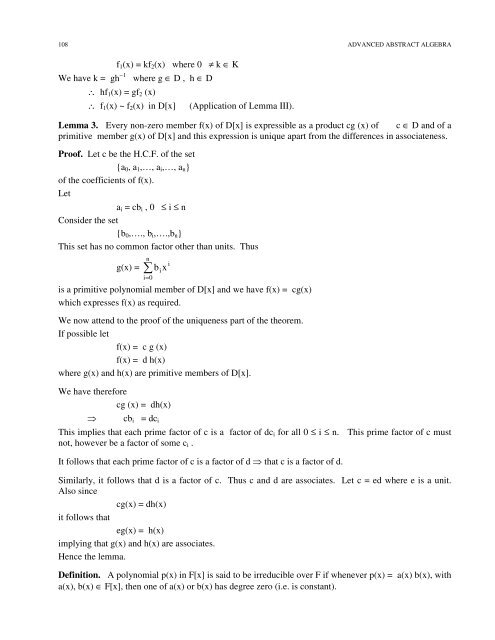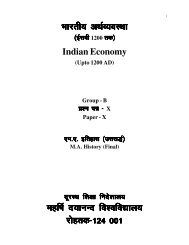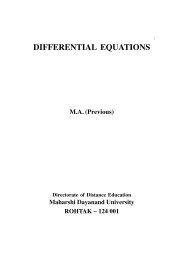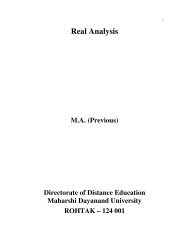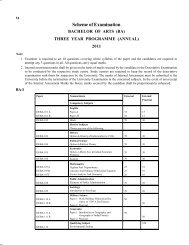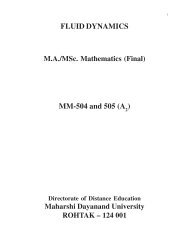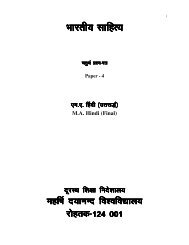Advanced Abstract Algebra - Maharshi Dayanand University, Rohtak
Advanced Abstract Algebra - Maharshi Dayanand University, Rohtak
Advanced Abstract Algebra - Maharshi Dayanand University, Rohtak
Create successful ePaper yourself
Turn your PDF publications into a flip-book with our unique Google optimized e-Paper software.
108<br />
ADVANCED ABSTRACT ALGEBRA<br />
We have k = gh −1<br />
f 1 (x) = kf 2 (x) where 0 ≠ k ∈ K<br />
∴ hf 1 (x) = gf 2 (x)<br />
where g ∈ D , h ∈ D<br />
∴ f 1 (x) ~ f 2 (x) in D[x]<br />
(Application of Lemma III).<br />
Lemma 3. Every non-zero member f(x) of D[x] is expressible as a product cg (x) of c ∈ D and of a<br />
primitive member g(x) of D[x] and this expression is unique apart from the differences in associateness.<br />
Proof. Let c be the H.C.F. of the set<br />
{a 0 , a 1 ,…, a i ,…, a n }<br />
of the coefficients of f(x).<br />
Let<br />
a i = cb i , 0 ≤ i ≤ n<br />
Consider the set<br />
{b 0 ,…., b i ,….,b n }<br />
This set has no common factor other than units. Thus<br />
n<br />
i<br />
g(x) = b ix<br />
i=<br />
0<br />
is a primitive polynomial member of D[x] and we have f(x) = cg(x)<br />
which expresses f(x) as required.<br />
We now attend to the proof of the uniqueness part of the theorem.<br />
If possible let<br />
f(x) = c g (x)<br />
f(x) = d h(x)<br />
where g(x) and h(x) are primitive members of D[x].<br />
We have therefore<br />
cg (x) = dh(x)<br />
cb i = dc i<br />
This implies that each prime factor of c is a factor of dc i for all 0 ≤ i ≤ n. This prime factor of c must<br />
not, however be a factor of some c i .<br />
It follows that each prime factor of c is a factor of d that c is a factor of d.<br />
Similarly, it follows that d is a factor of c. Thus c and d are associates. Let c = ed where e is a unit.<br />
Also since<br />
cg(x) = dh(x)<br />
it follows that<br />
eg(x) = h(x)<br />
implying that g(x) and h(x) are associates.<br />
Hence the lemma.<br />
Definition. A polynomial p(x) in F[x] is said to be irreducible over F if whenever p(x) = a(x) b(x), with<br />
a(x), b(x) ∈ F[x], then one of a(x) or b(x) has degree zero (i.e. is constant).


